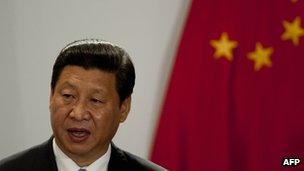China paper in detained journalist plea
- Published

A screen shot of the New Express headline that reads "Please Release Him"
A Chinese newspaper has published a rare front-page plea for the release of one of its journalists held by police.
The New Express, based in Guangzhou, called for Chen Yongzhou, who was detained last week, to be freed.
The paper said Mr Chen's detention was linked to reports he wrote about a part state-owned construction equipment company based in Hunan.
Police in Hunan have confirmed the journalist has been detained for "damage to business reputation''.
Earlier this year, Mr Chen wrote several reports about Zoomlion, which is partly owned by the Hunan provincial government.
Zoomlion issued a statement after one New Express article, which alleged it had improperly accounted for sales, caused its share price to drop.
In a statement to the Hong Kong stock exchange in late May, the company called the claims "false, groundless and misleading".
'Too naive'
The New Express led its article with a large three-character headline that read "Please Release Him".
It said it had remained quiet so far because it feared Mr Chen, who was detained on 19 October, might be mistreated.
"We always thought that as long as we report responsibly then there would be no problem; and even in the event of a problem, we can publish corrections and apologise; if it is really serious, and we lose a court case, we will pay or shut down if we have to," the editorial said.
"But the fact is, we are too naive. Chen Yongzhou had spent three days and three nights [in custody] before he saw a lawyer," it added.
Like all Chinese newspapers, the New Express comes under strict state control, but it has nonetheless gained a reputation for investigative journalism, says the BBC's John Sudworth in Shanghai.
"We are a small newspaper, but we have the backbone no matter how poor we are," the paper said in its piece.
Recent years have seen sporadic clashes between Chinese media outlets and the authorities.
In January, journalists at the Guangdong-based Southern Weekly newspaper called for a propaganda chief to quit, after he changed an editorial into a Communist Party tribute.
The row sparked small protests and displays of solidarity from other media outlets before the issue was resolved.
'Safeguard rights'
There have been strong reactions to the news of Chen Yongzhou's detention from users of weibo, China's version of Twitter.
Around 30 lawyers have put forward their names to rally support for Mr Chen and organised a virtual body - "Observation Group on the Detention of New Express Reporter Chen Yongzhou". But the group have not said what they plan to do.
Media professionals, including journalists, are also using weibo to join the call for police to release Mr Chen.

The plea comes amid an apparent crackdown on media and bloggers by Xi Jinping's government
An editor from Dongfang Jinbao, a Henan-based newspaper, wrote: "Support New Express to safeguard the rights of its journalists. The bottom line of consensus in today's society is rule of law. Why did the police arrest Mr Chen? On what legal basis? Is it detention or arrest?"
Weibo users have also commented on the censorship of the news of Mr Chen's detention.
Another journalist from Henan province added: Within 10 minutes, all major internet portals like Sina, Sohu, Tencent and others have withdrawn the story from their home pages. This is a moment of shame for all (except a few) journalists in China.
Other users, however, are urging restraint, saying that it is not good to jump to any conclusions now.
The appeal by the New Express comes as the administration led by President Xi Jinping takes a tough approach to press and internet freedom.
China's 250,000 journalists and reporters are currently undertaking compulsory on-the-job training. Critics say its apparent aim is to make sure that journalists toe the party line.
Some internet bloggers with large numbers of followers on weibo have been arrested for allegedly "spreading rumours". Other high-profile bloggers have stopped posting comments on sensitive issues, apparently fearing reprisals by the government.
Rights group Reporters Without Borders has added Xi Jinping to a list of 39 leaders and groups identified as Predators of Freedom of Information in 2013.
- Published11 January 2013
- Published10 January 2013
- Published8 January 2013
- Published8 January 2013
- Published7 January 2013